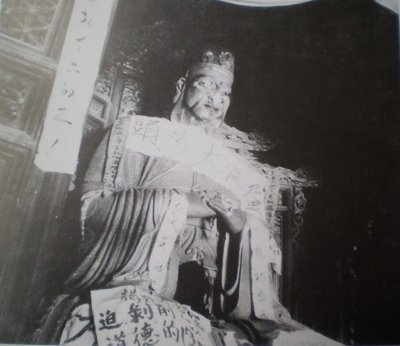Wholegrain
SENIOR MEMBER

- Joined
- May 14, 2013
- Messages
- 1,921
- Reaction score
- 3
- Country
- Location
If Japan could ruled China until now (with out intervention of Soviet U and USA in WW II), such stupid chinese boy could say That: Japanese adopted to confucius so thethey could rule China like Mongolian and Manchurian in the past.
If you keep on insulting other members and lying without providing any sources, I will continue to down rate your posts. You were the one who provoked KirovAirship.
The Manchus called themselves, "Dulimbai Gurun i niyalma", which means "Zhongguoren" AKA "Chinese people". They called the Qing as "Dulimbai Gurun" -Zhongguo,
https://webspace.utexas.edu/hl4958/perspectives/Zhao - reinventing china.pdf
The Japanese never called themselves Chinese during World War 2, they were Japanese ultranationalists and they didn't even annex any part of mainland China, instead they set up puppet states.
And Vietnamese love claiming Chinese dynasties like Tran and Ho as Vietnamese, even though the Tran and Ho neither called themselves Nguoi Kinh, nor Nguoi Viet.
The Soviet Union fought against China in WWII.
Ili Rebellion - Wikipedia, the free encyclopedia
OK, Manchurian speak their own language.
But, Man-da-rin language is " 滿大人" language => Language úsed by Manchurian to rule China.
Tran, Ho came from Yue people to Vietnam very long time and became Vietnamese. Vietnamese didn't discriminired them. They defended Independence of Dai Viet from invasion of Chinese. They did good job.
However An Nam Chi Luoc stated Tran family is Jiao Zhi people.
You can ask some chiese PDF members, they ststed that Japan is in Sino-sphere with influences of Confucus.
If you deny that you can also say that Japanese used Han Ji for writing Kan Ji, he he.
When lying, its best not to lie about something which can be exposed so easily.
Online Etymology Dictionary
mandarin (n.)

"Chinese official," 1580s, via Portuguese mandarim or older Dutch mandorijn from Malay mantri, from Hindi mantri"councilor, minister of state," from Sanskrit mantri, nominative of mantrin- "advisor," from mantra "counsel," from PIE root*men- "to think" (see mind (n.)).
Form influenced in Portuguese by mandar "to command, order." Used generically for the several grades of Chinese officials; sense of "chief dialect of Chinese" (spoken by officials and educated people) is from c.1600. Transferred sense of "important person" attested by 1907. The type of small, deep-colored orange so called from 1771, from resemblance of its color to that of robes worn by mandarins.
Chinese Etymology Home Page
"Mandarin originally refers to the language spoken by Chinese officials who were mainly from Beijing. This language was called Guan-Yu 官語 Official-Language. The Sanskrit word Mandari comes through Portuguese and means commander related to English Mand-ate The early Portuguese referred to these people and their language as Mandarin"
Last edited:











